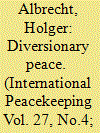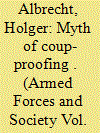| Srl | Item |
| 1 |
ID:
174761


|
|
|
|
|
| Summary/Abstract |
What is the impact of international peacekeeping missions for civil-military relations at home? This article unpacks the conditions that produce positive effects of peacekeeping participation on the domestic politics of an authoritarian regime. Drawing on field research, I discuss four mechanisms that link foreign policy making to domestic civil-military relations in Ben Ali’s Tunisia. First, the deployment of troops for peacekeeping abroad presents obstacles for the coordination of coup plots at home. Second, incumbents can allocate material resources to meet officers’ economic grievances. Moreover, peacekeeping operations serve to enhance corporate institutionalization through specific training programmes. Finally, peacekeeping contributes to a professional ethos and hence the depoliticization of the officer corps. These findings give rise to the notion that contributing to peace can have similar effects for domestic politics as going to war.
|
|
|
|
|
|
|
|
|
|
|
|
|
|
|
|
| 2 |
ID:
146924


|
|
|
|
|
| Summary/Abstract |
The capitalist peace thesis argues transnational economic ties have a pacifying effect on interstate relations. An extension of this literature reports that economic ties can prompt belligerents in civil conflicts to peacefully resolve their disputes and can attract third-party intervention from states with strong economic ties. This pacifying effect of economic ties, we argue, is applicable in the context of coups d’état: as a state becomes more economically interdependent with the rest of the world, the opportunity costs of domestic political disturbances are raised for both the targeted state and its financial partners. These costs – potential economic losses and a damaged economic reputation – influence belligerents in the state to use constitutional means to resolve their disputes while providing stronger incentives to foreign economic partners to influence the calculus of these belligerents as they consider the coup attempt. We test this argument quantitatively by investigating the influence of a dozen indicators of economic openness on coups in a global sample of states from 1952 to 2007. Our findings demonstrate the applicability of the capitalist peace thesis to coups d’état, manifestations of political uncertainty that are less likely to be accompanied by substantial loss of life or destruction of infrastructure.
|
|
|
|
|
|
|
|
|
|
|
|
|
|
|
|
| 3 |
ID:
141168


|
|
|
|
|
| Summary/Abstract |
This article argues that coup-proofing does not necessarily reduce the general propensity among military officers to stage coups d’état against authoritarian incumbents. Sophisticated coup-proofing terminates coup cascades and buys incumbent rulers time in office, but general coup risk remains high even if they maintain power for long periods of time. The article uses a new data set on coups in the Middle East and North Africa covering the period 1950–2013. The data reveal that the number of coup instances has decreased over time, but the risk for incumbents of falling to a coup during their extended time in office remains constant, even in coup-proofed autocracies. When autocrats apply coup-proofing measures, timing and agency become increasingly important. Plotters attempt coups either immediately after power turnovers or when incumbents turn into lame ducks after excessively long periods of rule. Success rates increase when coup plotters are supported by central military leaderships.
|
|
|
|
|
|
|
|
|
|
|
|
|
|
|
|